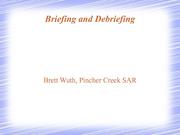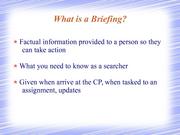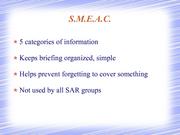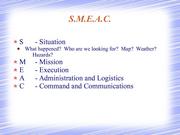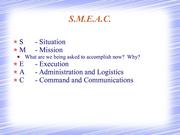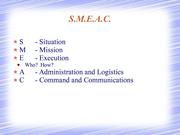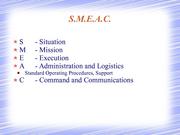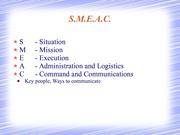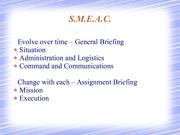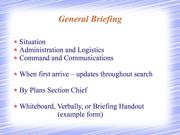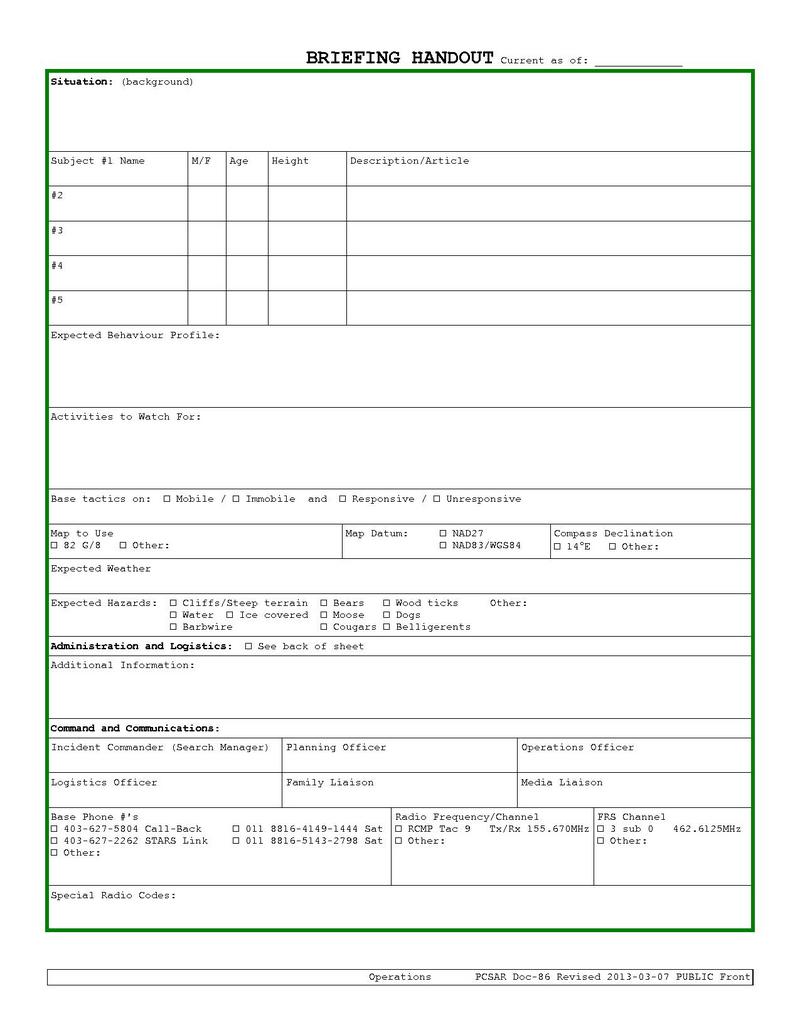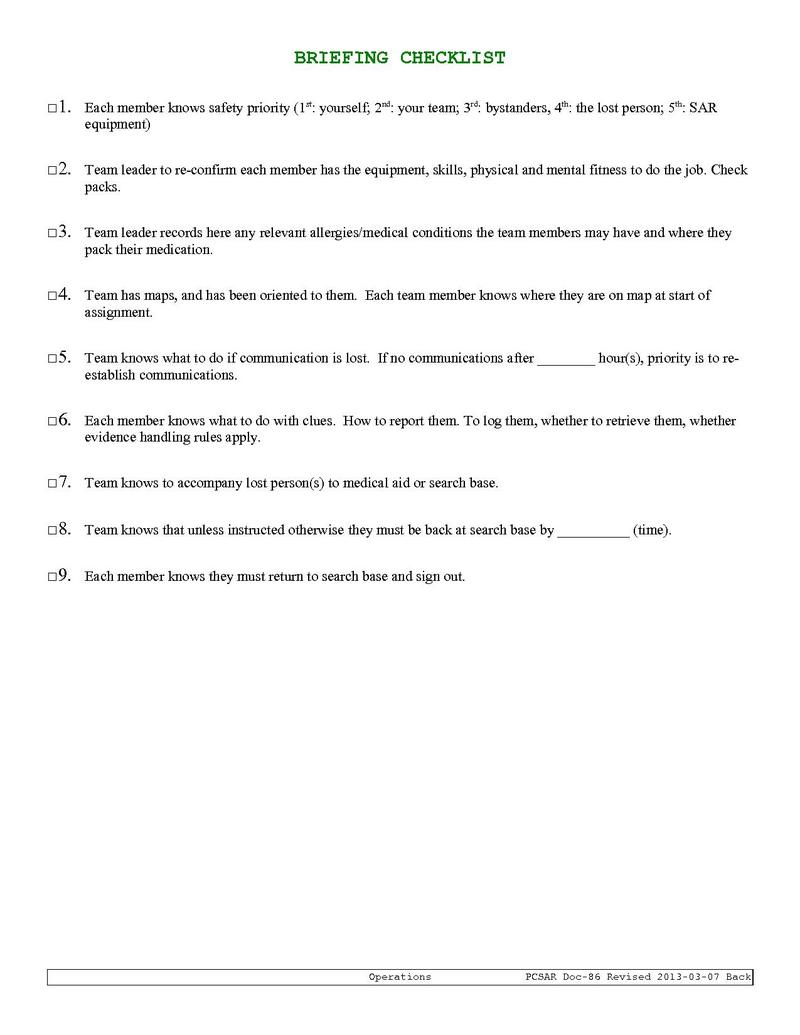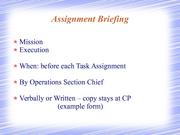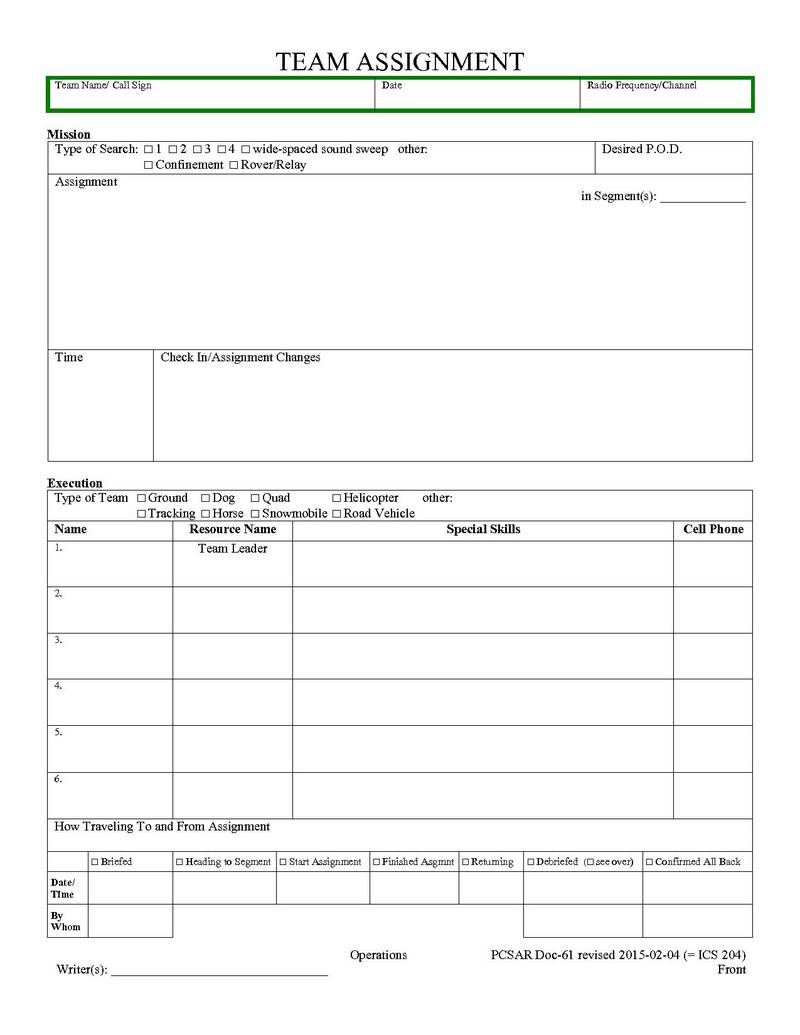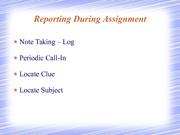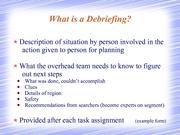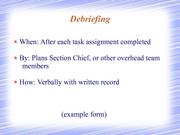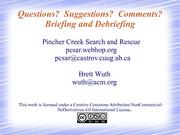SAR Fundamentals/Briefing debriefing
From PCSAR
Contents |
[edit] Subject
What is this lesson plan about?
[edit] Authors
List who wrote this lesson plan.
[edit] Scope
What is included in this lesson, what's not and why.
- Addresses part of CSA Z1625
- part of 4.9.3 Activation (call-out), check-in, and initial briefing
- part of L3. Identify the type of information covered in deployment and initial briefings.
- partial: initial briefing (not deployment)
- part of T6. Types of information covered in deployment and initial briefings.
- partial: initial briefing (not deployment)
- part of L3. Identify the type of information covered in deployment and initial briefings.
- part of 4.9.4 Assignments
- L2. Outline the components of an assignment briefing.
- L4. Outline recording and reporting requirements for assignments.
- T2. Components of an assignment briefing, including situation, mission, execution, administration, command, and communications (SMEAC).
- T4. Recording and reporting requirements (e.g., note taking, periodic call-in, clues/subject located) related to the implementation of search assignments.
- ICS 204 form ~ Team Assignment Sheet ~ Briefing checklist
- part of 4.9.3 Activation (call-out), check-in, and initial briefing
- SAR Fundamentals Manual: Appendix D "Briefing and Debriefing Checklists"
- Suprisingly this subject does not appear to be covered in the SAR Basics manual
[edit] Prerequisites
What should students already know/have accomplished before the lesson is presented.
[edit] Objectives
At the conclusion of this lesson the participants will be able to
- Identify the type of information covered in initial briefings.
- Outline the components of an assignment briefing.
- Outline recording and reporting requirements for assignments.
- what information they should have at the start of their task and how to get it.
- what information they should provide at the end of their task.
[edit] Time Plan
Total Time: 30 minutes
| Time | Material
|
|
00:00 3 min |
Introduction Introduce topic title Introduce Instructor Present Objectives
|
|
00:03 1 min |
|
|
00:04 2 min |
SMEAC
|
|
00:06 1 min |
Situation
|
|
00:07 1 min |
Mission
|
|
00:08 1 min |
Execution
|
|
00:09 1 min |
Administration and Logistics
|
|
00:10 1 min |
Command and Communications
|
|
00:11 1 min |
General vs Assignment Briefing
|
|
00:12 5 min |
|
|
00:17 5 min |
|
|
00:22 2 min |
Reporting
|
|
00:24 5 min |
Debriefing
|
|
00:29 1 min |
Questions |
[edit] Aids
What materials are needed or useful in presenting this lesson.
- slides (download/print: .pdf; edit: .odp)
- Briefing Handout (PCSAR DOC-86)
- Pincher SAR Task Assignment / Debriefing (PCSAR DOC-61)
- Image:Members:ICS Form 204.pdf
- SAR Fundamentals Manual - Appendix D
[edit] Reference Material
If you need to cite sources, do so here.
[1]
- SMEAC
- https://www.youtube.com/watch?v=M5OpfgXfSrg
- 15 min
- a bit too much on leadership for this module
- Describes a bit of the history (US Civil War) of the development of SMEAC. Gives context of military use. Applies to leadership style for large corporations
- C : Command and Control
- https://www.youtube.com/watch?v=9b5ISov2aYs
- 12 min
- a bit too military specific for SAR presentation
- hints that gives some advance thought which would be useful for the instructor
- OSMEAC - US Marine variant
- O : Orientation
- NATO standard for interoperability
- C : Command and Signal
- https://www.youtube.com/watch?v=M5OpfgXfSrg
- see sar/pc/training/subject/sar-fundamentals/components/subject/07-briefing-debriefing
- SAR Fundamental Instructor's Outline - Chapter "Search" Part III.F and III.H
- Appendix D outline Jorgensen/Waiboer
- Old Lesson Plan (download/print: .pdf; edit: .odt)
- Training/Ideas/Briefing and debriefing
[edit] Question bank
List of questions suitable for an review/exam of this section.
See Question bank
[edit] Frequently Asked Questions
What are some of the questions that students typically ask. Include the answers.
[edit] Feedback
When has this lesson been presented. What was the feedback.
[edit] License
What can others do with this lesson?
Recommended license below. Fill in the year and the author's name(s):
Copyright © YEAR, Author. This work is licensed under a Creative Commons Attribution-NonCommercial 2.5 Canada License. To view a copy of this license, visit http://creativecommons.org/licenses/by-nc/2.5/ca/ or send a letter to Creative Commons, 559 Nathan Abbott Way, Stanford, California 94305, USA.
[edit] Notes
Any additional notes, etc.
[edit] To do
- Add forms to slides instead of swapping screens
- Q: standardization of forms
- Samples of other team's forms
